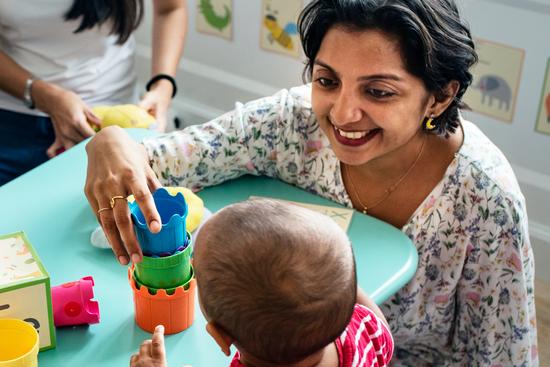Our customers have been hired at: *Foot Note
AI Resume Skills Generator

Childcare skills go beyond watching children. It provides developmental support, healthy nutritional services as well as a safe, hygienic environment to thrive. The skills needed for childcare can make a difference in the children’s lives and in your career.
The Bureau of Labor Statistics projects 153,100 yearly openings for child care workers over this decade. In a competitive market, writing a resume with the right childcare skills can help you land the right job.
What are childcare skills?
Child care skills are the abilities workers use to provide quality care, promote growth and assist children's development. It includes hard and soft skills.
The skills you need to work in childcare must be balanced between providing the best quality childcare, collaborating with coworkers and communicating effectively with the families and community.
Make a resume with MyPerfectResume
Our Resume builder can help you write the perfect resume. Start Now!
Examples of child care skills
These childcare resume skills are essential for your resume. Providing the best possible care uses a combination of skills that cater to child development, family communication, collaborating with colleagues and knowing how to use childcare tools.
Hard skills
Hard skills are acquired through education and experience. These skills in childcare support children's development, their health and family engagement.
- Child safety
- Hygiene care
- Medication administration
- Parent engagement strategies
- Play-based learning
- Feeding assistance
Soft skills
Soft skills for childcare support how you perform your job. These skills are all about your habits and performance.
- Time management
- Creativity
- Cultural sensitivity
- Flexibility
- Adaptability
- Work ethic
- Punctuality
Interpersonal skills
Caring for children means connecting with their parents or caretakers and your colleagues to ensure reliable care. Interpersonal skills help you connect with others and the children.
- Collaboration
- Leadership
- Communication
- Empathy
- Active listening
- Teamwork
- Trustworthiness
Transferable skills
If you have experience in a different industry or are seeking to move on from child care, these transferable skills can be included in your resume.
- Attention to detail
- Conflict management
- Multitasking
- Resourcefulness
- Emotional intelligence
- Record-keeping
- Documentation
- Critical thinking
Emerging child care skills
Providing the highest-quality care requires keeping up with an evolving landscape. These child care emerging skills are the key for those seeking to care for and develop young children.
- Trauma-informed care
- Mindfulness
- Multilingualism
- Inclusivity education
- Digital literacy
- Cross-cultural skills
- Remote learning support
How to improve childcare skills
Improving your childcare skills prepares you for the next level of your career. There are different ways that’ll help you become a desirable candidate.
- Through continued learning: Develop your skills through training, workshops and seminars. This will help you
- Seek guidance and mentorship: Every child has their own needs. Ask their families for feedback and guidance on how to best serve them. Also, seek out your experienced mentors to learn more by simply observing their work and receiving feedback.
- Keep up with the latest research and practices: Whether through your employer or on your own, find reliable resources with the most recent information and child care training.
- Self-evaluate: Completing a self-evaluation daily or weekly will help you formulate better questions, seek specific feedback from colleagues, and identify areas for improvement.
Make a resume with MyPerfectResume
Our Resume builder can help you write the perfect resume. Start Now!
How to include childcare skills in a resume
Your child care skills will be throughout your document. Each section is designed to highlight a different skill, and, as a whole, the resume presents you as a desirable candidate.
- In your career statement — This is your introduction and should be approached as if the recruiter would only read this section. Use your strongest child care skill, years of experience and include an achievement.
For example:
Dedicated child care worker with five years of experience providing high-quality trauma-informed care. Skilled in developing cognitive, physical, emotional and social activities. Nature-based learning and mindfulness proponent.
- In your skills section — This is the specialized skills section. Match as many childcare skills from the job description as possible and list them using bullet points. Include 6 to 12 skills. Focus on hard skills but include two to three soft skills.
For example:
|
- In your work experience — Your childcare worker skills shine in your professional history. In this section, you show exactly how you’ve successfully used your skills by including three bullet points with quantifiable resume accomplishments per role.
For example:
- Developed and implemented a daily curriculum for a 12-children classroom, increasing positive behavior and engagement.
If you have no experience in child care, you can tailor your resume work history to include relevant achievements from other experiences, like volunteer work, internships or apprenticeships.
Common tools for child care providers
To provide quality childcare, you must familiarize yourself with common tools used in child care. These tools will expand your skill set and help you stand out from other candidates.
- First aid equipment — Accidents happen. Quick and reliable first aid for children is essential. A well-trained childcare worker must know how to treat scrapes and cuts with bandages, gauze and antiseptics.
- Cleaning supplies — Properly disinfecting play areas and work surfaces is a critical skill in child care. Professionals must know how to use nontoxic, child-safe cleaners and when to use a different cleaning product without harming children.
- Infant hygiene supplies — Infant hygiene is a cornerstone of their health. Knowing how to tend and handle infant wipes, rash creams and diapers is a must-have childcare skill.
- Sensory materials — Play-Doh, sand, water, wood and slime provide a learning experience in a fun environment. Knowing how to safely use these materials can help you and your children excel.
Certifications
Child care certifications empower your resume. They show your commitment and expertise to providing the best care possible, and they can also be a requirement for working in the profession.
Child care certification requirements vary by state. Confirm with your state regulatory agency and the National Center on Early Childhood Quality Assurance (NCECQA).
These are certifications that prepare you for childcare and specialized care:
- Child Care Professional (CCP)
- Child Development Specialist Certification
- Infant and Toddler Care Certification
- Special Needs Certification
- Child Development Associate (CDA)
- Early Childhood Education (ECE) Certification
In addition, these certifications can be required by state and employer:
- Pediatric First Aid
- CPR Certification
- Food Safety Certification
- Medication Administration in the Child Care Environment Certification
When in doubt, the National Association for the Education of Young Children (NAEYC) and the National Resource Center for Health and Safety in Child Care and Early Education (NRC) are great resources for learning more about childcare providers.
Key takeaways
- Childcare skills are the ability to provide care for children
- Childcare workers must comply with legal requirements, like licenses and certifications, to prove their abilities and provide care.
- In an ever-evolving society, emerging childcare skills are an integral part of workers' skill sets.
- Tools are a necessity to perform child care duties. An important part of childcare skills is the knowledge and experience in using these tools.
FAQ
What are child care skills?
Skills for child care are those abilities that help workers provide the best possible care to our youngest population. Whether in a school, daycare or in-home care, child care providers need a combination of soft skills, like communication, time management, creativity, empathy and cultural competence, and hard skills, like early education, toileting and hygiene care, record-keeping and safety regulations.
What skills do you need to work in childcare?
Your childcare skills should equip you to provide:
- A clean, safe environment
- Age and development-appropriate development
- High-quality care, integrating the families and community
To create this environment, you’ll need a balanced set of child care skills. For example, hard skills like childcare regulation, documentation and behavior management, and technical skills like hygiene, toileting and play-base learning,
Soft skills will help you perform your job and create a positive work environment. You can count on soft childcare skills like empathy, time management, creativity and communication.
Meanwhile, interpersonal skills will help you collaborate with coworkers, connect with children and keep open communication with parents. Some examples of these skills are conflict resolution, active listening, flexibility and teamwork.
How can a child care specialist increase social skills that will lead to better teamwork?
Providing quality child care requires teamwork. It’s important to actively improve your social and interpersonal skills. You can use different techniques
- Team building activities: games, projects, rotating tasks, trust-building activities, hypothetical problem-solving scenarios and celebrations are simple ways to help you connect with your team.
- Professional development as a team: Completing certifications, training and courses to improve not only your child care skills but also the entire team can connect to a common goal that benefits everyone.
- Use effective communication techniques: Practice active listening, use clear language and ask open-ended questions can help you and your team become more cohesive. Remember, communication also includes non-verbal cues, written communication and feedback.
What are emerging skills in childcare?
Emerging childcare skills are abilities that adapt to current social situations. These skills can help childcare professionals adapt to cultural changes, provide specialized care for their community, and expand their services to more specialized areas. Examples include remote learning, inclusivity, cultural competence, multilingualism and trauma-informed care.
How we reviewed this article
Since 2012, we have helped more than 11 million job seekers. We want to make your career journey accessible and manageable through our services and Career Center’s how-to guides and tips. In our commitment to bring you a transparent process, we present our Editorial Process.
Sources
- U.S. Bureau of Labor Statistics. Occupational Outlook Handbook. Childcare Workers
- Childcare Education Institute. Medication Administration in the Child Care Environment
- The Institute of Child Nutrition. Food Safety in Child Care
- U.S. Department of Agriculture. Professional Standards. Food Safety in Child Care
- Red Cross. Child Care Licensing & Red Cross Courses
- American Heart Association. Heartsaver Pediatric First Aid CPR AED Resources
- Council for Professional Recognition. National Credentialing Program. Become a CDA Professional Development Specialist™
- Battelle for Kids. Guide. 21st Century Learning for Early Childhood
- Administration for Children and Families. Office of Child Care. What Is Child Care Licensing?
- Bryant & Straton College. B&SC Blog Staff.12 Skills To Advance Your Childcare Career
- National Resource Center for Health and Safety in Child Care and Early Education. State Regulations
- National Association for the Education of Young Children. Accreditation.
- Newsweek. Article. Boroughs, Bryan. Supporting Families, Strengthening Businesses: The Crucial Role of Child Care Support
Our customers have been hired at:*Foot Note




